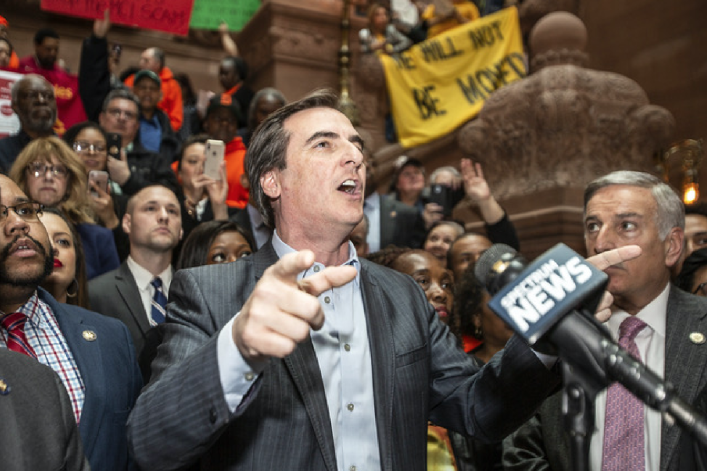NYC to get landmark tenant protections under new agreement that's poised to become law

Deputy Majority Leader Michael Gianaris at a tenants rally at the state capitol.
Courtesy of New York Senate
Over two million rent-stabilized tenants in New York City are going to be better protected from rent hikes under newly announced rent reforms. The Democratic-held New York State Assembly and Senate have agreed to change the rules on rent-regulated apartments just as they were set to expire. The newly hammered-out agreement ends vacancy decontrol, makes preferential rent last for the entire tenancy, and addresses Major Capital Improvements (aka building renovations) so they don’t create such a weighty rent burden.
The agreement also makes these changes permanent by taking away the expiration period that brought the law up for renewal every four years.
Landlords have fought hard against the measures and argued buildings would fall into disrepair unless there were incentives for upgrades. They’ve also predicted a wave of condo conversions if landlords can’t make ends meet. J'Nell Simmons, CEO of Landlords NY, a landlord resource, says these changes have "many landlords questioning their choice to become a landlord in the first place."
The governor still has to sign the bill before it becomes law but the changes are “significant,” says Mike McKee, a leading tenant activist with the Tenant’s Political Action Committee.
Jonathan Miller, president of real estate appraisal firm Miller Samuel says, "Rent reform will certainly reduce pressures on affordability" but he shares some of the landlords’ concerns about the availability and quality of the apartments themselves going forward, saying landlords will become disincentivized to improve their apartments without the ability to raise rents afterward.
Here's a look at the agreement as it stands.
An end to vacancy decontrol
Ending vacancy decontrol means rent-stabilized apartments will no longer be able to cycle out of the system if the rent reaches a threshold of $2,774.76 and the tenant moves out. A landlord has, until now, been allowed to remove the apartment from rent-stabilization if those criteria were met. Activists had pushed to retroactively re-stabilize apartments that had been deregulated but the bill doesn’t go that far.
An end to high-income decontrol
Tenants will also be protected if their income goes above the threshold of $200,000. Formerly, a landlord could remove high-earning tenants from rent-stabilized apartments.
Preferential rent changes
If a tenant is given a preferential rent that is lower than the legal rent, that rent will remain for the entire tenancy. This effectively means landlords can no longer offer attractively low rents only to put them up when the initial lease expires. Tenant activists believe 266,000 apartments in NYC have this type of rental arrangement.
Craig Roche (who requested we use a pseudonym) is a small landlord in NYC and says he expects this change to affect the supply of affordable apartments to “dry up,” or cause “rooming house-type situations.”
McKee disagrees, saying landlords will still offer the preferential rents because “they cannot get the legal rent in some neighborhoods,” meaning buildings in some neighborhoods do not command rents that high.
MCIs and IAIs
Tenant activists wanted the practice of raising the rent for building and apartment upgrades to be scrapped.
Instead, collecting funds for Major Capital Improvements—upgrades to the building—will be capped at 2 percent per year, which is down from a 6 percent annual rent increase to pay for the renovations.
Individual Apartment Improvements—upgrades that just affect the unit—can only cost the renter a maximum of $15,000 over a 15-year period. In addition, if you think your apartment has been illegally deregulated and you’ve been overcharged through IAIs or multiple vacancies, the rules have been loosened to allow you to challenge your landlord on it.
Landlords will likely be relieved the renovation incentives weren’t entirely scrapped but even so, some are predicting buildings will fall into disrepair.
Roche says he expects to see “literally no renovations" on units where a tenant has been in place a long time. "You won't see any real gut renovations, as there's no way to recoup the cost." He points out that with the requirements for tenant protection plans, lead abatement, dust containment, and landmarks he can’t see how a unit can be renovated for $15,000. “The soft costs are considerable,” he says.
Miller is, likewise, concerned that incentives for upgrades have been removed and says we could see a return to what we saw in the 1970’s which is a “deterioration in the quality and maintenance of these buildings, with owners unable to sell.”
Condo conversion rules
To address the threat of a wave of rental buildings converting to condos, the bill includes a provision that makes this route more difficult. Landlords now need 51 percent of tenants to agree to buy their units in order for it to convert, and tenants who don’t agree will be allowed to stay on.
Sam Himmelstein, partner at Himmelstein, McConnell, Gribben Donaghue & Joseph (and a Brick Underground sponsor), says the new bill will broadly “cut down on evictions” and the tighter condo conversion rules might mean the return of “insider prices” for tenants who are able to buy if a landlord chooses to sell.
McKee says the bill is a “turning point” in the “decade long fight between the New York real estate lobby and the statewide tenant movement.” For him, the bill is a qualified victory. (A “good cause” eviction bill that would have extended protections to market-rate tenants throughout the state isn’t in the package of reforms.)
“All tenants in small buildings—because rent-stabilization only applies to buildings with six or more apartments—are not protected. All these tenants are unprotected so five million tenants in the city, suburbs and the rest of the state have been left without protections,” he says.
You Might Also Like































